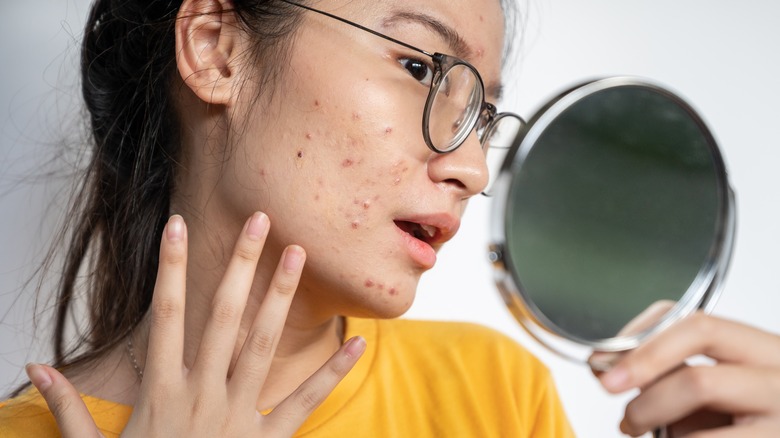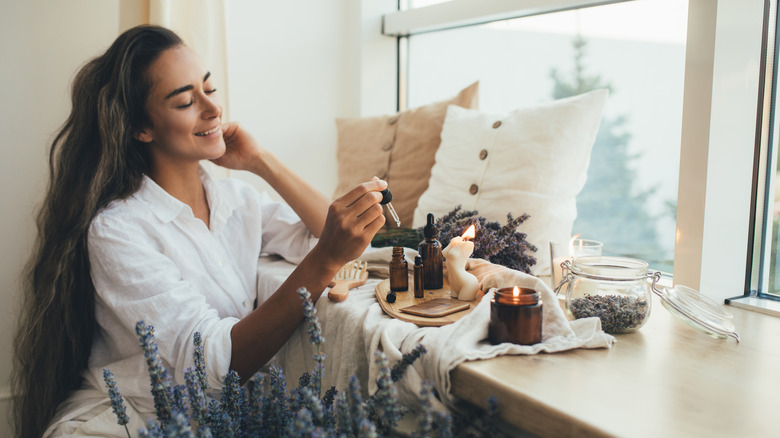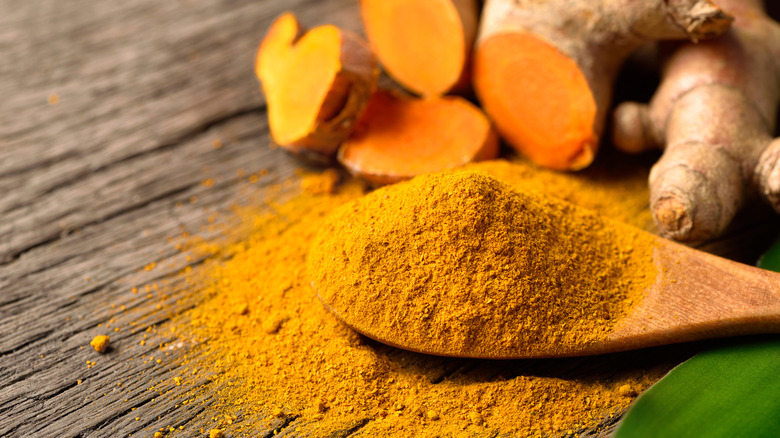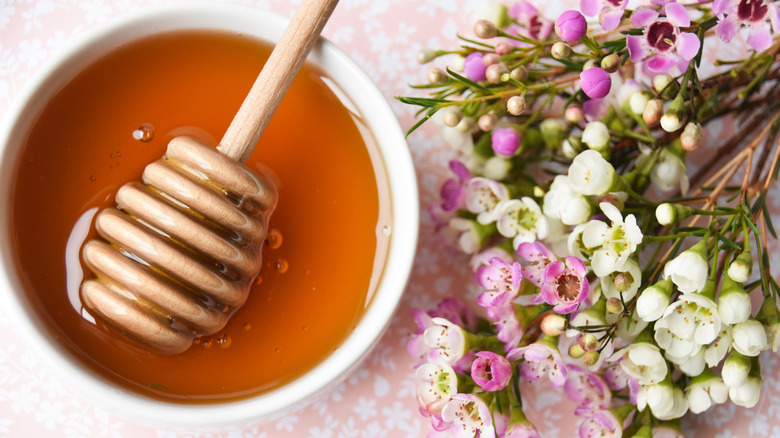Holistic Acne Treatments That Are Better Than What You've Been Doing
Have you ever tried holistic acne treatments like green tea, Manuka honey, or jasmine oil? These natural remedies have none of the side effects of conventional acne medications and could make a world of difference. For example, Accutane (isotretinoin) — one of the most widely prescribed drugs for acne — can have severe side effects, such as joint pain, depression, miscarriages, liver damage, and vision problems, reports The Atlantic. On top of that, it might not even work.
About 50 million Americans are diagnosed with acne each year. From children and teens to middle-aged adults, anyone can develop this skin condition. Its symptoms range from mild to severe and may include whiteheads and blackheads, cysts, papules, nodules, and everything in between, explains the Cleveland Clinic. Unfortunately, there's no guarantee that things will get better after treatment. In the worst-case scenario, you might end up dealing with new symptoms caused by medication.
That said, it may be worth taking a holistic approach to acne treatment rather than popping pills. Listed below are some options you might want to consider.
Soothe skin inflammation with essential oils
Essential oils are commonly used in the treatment of acne, rosacea, eczema, and other skin conditions. A good example is rosemary essential oil, which may help destroy Propionibacterium acnes, the bacterium responsible for acne breakouts, reports a 2007 study published in Planta Medica. You may also try tea tree oil for its antibacterial and anti-inflammatory effects. This natural remedy is rich in terpenes, limonene, and other phytochemicals that may help kill common bacterial strains like P. acnes, S. aureus, Lactobacillus, and E. coli, according to 2015 research featured in the journal Clinical Microbiology Reviews.
Another option is lavender essential oil, which can accelerate healing and prevent acne scars. David Karlak and Susan Griffin-Black, two experts interviewed by Byrdie, also recommend cypress, rosehip seed, or jojoba oil. For example, rose oil contains farnesol, a compound that soothes dry skin and reduces excess sebum, notes Griffin-Black.
Remember to dilute your favorite essential oils with a carrier oil before applying them to the skin. These products are very concentrated and may cause irritation if used undiluted. As a general rule, add one drop of essential oil for every three drops of coconut, avocado, or olive oil, suggests doTerra. Lavender essential oil can be used as is, but it's best to dilute it if you have sensitive skin.
Turmeric can reduce swelling and kill acne-causing bacteria
Turmeric, the brightly colored spice used in Indian cuisine, may help reduce acne and improve skin health, according to a 2016 review featured in Phytotherapy Research. This plant displays antimicrobial and anti-inflammatory effects, protects against oxidative stress, and may reduce the severity of psoriasis, acne, vitiligo, and other skin disorders. Its health benefits are due to curcumin, a naturally occurring compound, explained dermatologist Purvisha Patel in an interview with Well+Good. He recommends taking 400 to 600 milligrams of turmeric daily for severe acne. You may also use turmeric face masks to soothe irritated skin and achieve a radiant complexion.
A 2019 review published in the journal of Nutrients reports that curcumin can benefit those with inflammatory or infectious skin conditions, such as acne. It not only reduces swelling but also helps with wound healing and prevents skin aging. Due to its antibacterial properties, it can destroy P. acnes and protect against skin infection. Piperine, an active compound in black pepper, can increase curcumin bioavailability by up to 2,000%, allowing you to fully reap its benefits, suggests an earlier study featured in Planta Medica.
Manuka honey, a promising remedy for acne
Manuka honey is perhaps one of the most underrated natural remedies for acne. This product does more than just boost your immune system — it also exhibits strong antimicrobial properties and can inhibit the growth of P. acnes, S. aureus, Malassezia, and other pathogens responsible for skin disorders, reports a 2016 review featured in the Central Asian Journal of Global Health. "The antibacterial effects of Manuka honey are a lot higher than other honey counterparts," dietitian Bailey Flora told the Cleveland Clinic. "It's about 100 times higher than other traditional honey," she added.
Flora also says that Manuka honey fights inflammation and hydrates the skin, which may benefit those with acne. At the same time, it promotes wound healing and tissue repair. Its antimicrobial effects are due to methylglyoxal (MGO), a naturally occurring compound. Ideally, look for Manuka honey varieties labeled "MGO 250+", recommends dermatologist Karen Hammerman (via Women's Health). For best results, apply a small amount to the affected area as soon as you feel a zit coming on.
Honey may also prevent and reduce acne scars, according to 2013 evidence published in the Jundishapur Journal of Natural Pharmaceutical Products. This is partly due to its wound healing properties and partly due to its strong anti-inflammatory activity and low pH. Depending on your preferences, you can use it as is or mix it with turmeric, lavender oil, and other natural ingredients to make a face mask for acne-prone skin.



